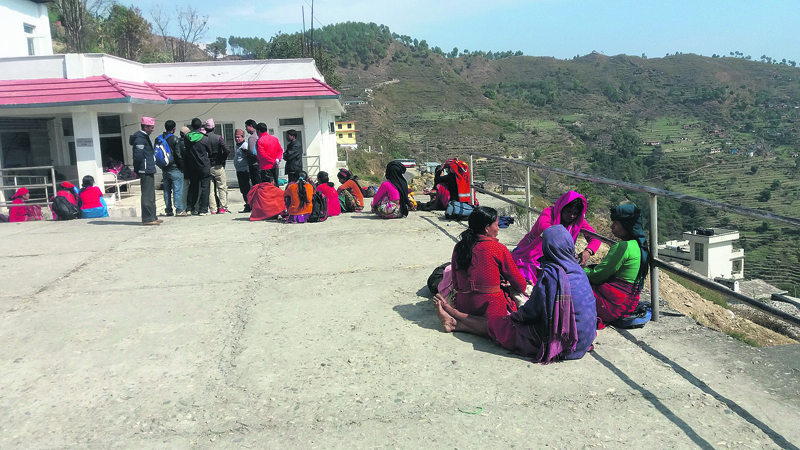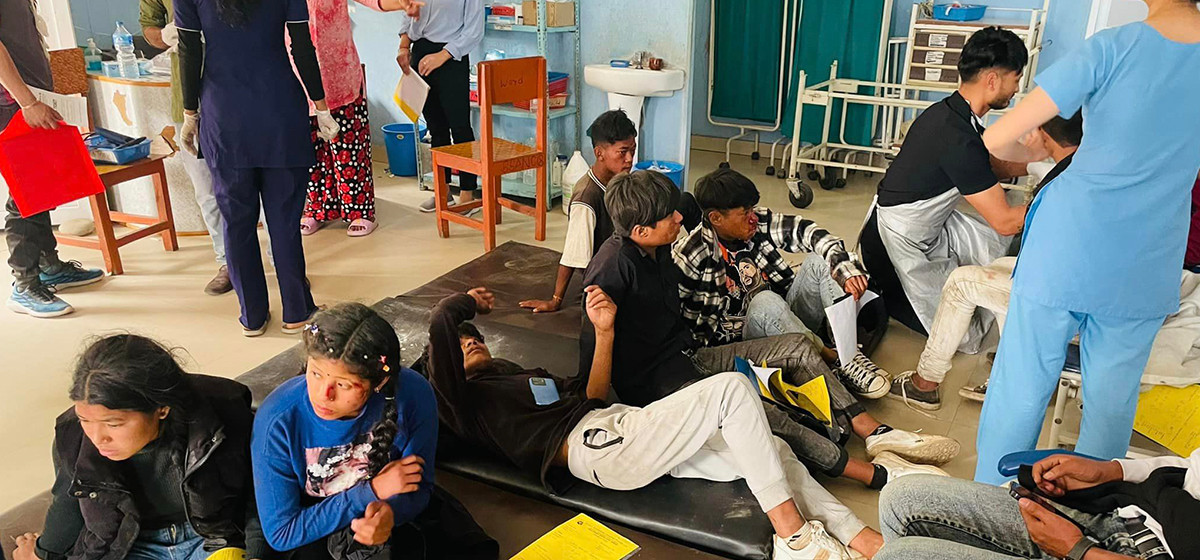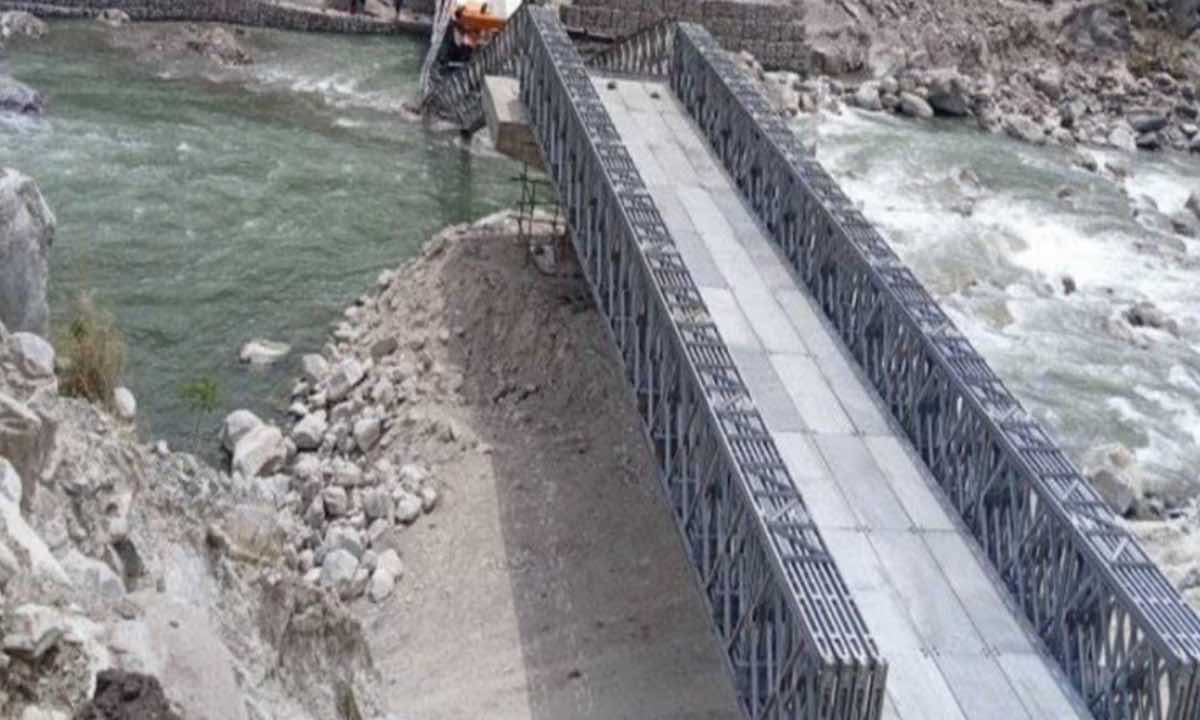
OR
Rural women still shy of seeking treatment for uterus prolapse
Published On: March 16, 2017 07:32 AM NPT By: Arun Bam

DOTI, March 16: Many women in the farwestern region are living a difficult life because of their reluctance to seek treatment for uterus prolapse, a severe yet increasingly common condition among women who have had one or more vaginal births. Fear of social stigma and discrimination are still the main reasons behind their hesitations.
Elaborating on this medical condition, doctors say, muscles, ligaments, and other organs hold the uterus in the pelvis. If these tissues are weak or stretched, the uterus drops into the vaginal canal, leading to uterus prolapse.
Sharing her story, an elderly woman of Silgadhi Municipality of Doti district, who is now 65, said she had uterus prolapse about 30 years ago. By that time, she had given birth to five children.
“I felt my lower abdomen has dropped down and experienced severe pain. Sometimes it would become unbearable. As my husband used to work in India and there were only in-laws to talk to, I didn’t share it with anyone due to shyness,” she said, wishing to not be identified.
Even after her husband returned from India, she did not share the problem with him due to fear, guilt and shyness. “As there was none who I could share my problems, I just stayed in my room, crying almost every night. When the pain became unbearable during day, I used to go somewhere far away where no one could see me, and cry,” she said reminiscing those days.
“My health problems became worse as the time passed. My working capacity also decreased. Although I wasn’t able to work much, I had no choice.” As she grew weaker, she also faced lashing from her in-laws after she brought home lesser firewood and fodder.
More years passed. Despite shouldering household responsibilities after the death of her in-laws, she still could not muster courage - her shyness persisted. She said the last five years were the most difficult period for her as her health condition got worse. “Water-like white fluids started flowing out of my private organs. Finally my daughter-in-law noticed it and forced me to share my pain with her. After 30 years I was finally able to share it with my daughter-in-law.”
After her daughter-in-law persistently insisted, she finally visited Doti District Hospital for medical check-up. Health workers told her about her uterus proplapse and suggested a surgery to correct the condition.
“We had no money to pay for the surgery. But the doctors informed us that a campaign to provide free surgery for uterus prolapsed women is going to be organized. So we waited for the campaign,” said her daughter-in-law, who accompanied her to the campaign recently.
This is just a representative case. Many women in the rural areas of the district are still in hesitant to talk about uterus prolapse. Some of them are not aware that it is a medical condition that can be treated and therefore have been living with uterus proplase for years. Shyness and social stigma related to women reproductive health are other main factors preventing them to open up about the problem.
The campaign was jointly organized by the Far-western Regional Health Directorate, Dipayal and the Nepalgunj Medical College (NMC), Kohalpur from March 4 to 10. A total of 184 women from Doti, Accham and Bajura districts were treated at the campaign. Of the 110 women from the district, who consulted with doctors at the campaign, 25 with severe problem were referred to NMC for further treatment.
“We have found that most of the women who participated in the surgery had suffered uterus prolaspe for at least 10 years,” informed Ram Bahadur Malla, field coordinator of Nepalgunj Medical College. “Women between 40-80 years old participated in the free surgery campaign and received treatment.”
According to Doctor Sabita Malla of the NMC, most of the women hesitate from seeking treatment due to shyness and fear of being looked down upon. “As this health problem is related to reproductive health, most of them don’t speak about it and keep it hidden,” she said.
According to Far-western Regional Health Directorate, the problem of uterus prolapse is common in the region. The directorate informed that situation is equally prevalent in Accham and Bajura districts of the region. 32 patients participated in the campaign from Bajura, while 42 participated from Accham. However these are not only living with condition in those districts, Dr Malla opined.
“Women in the rural areas have to do heavy works even during menstruation, pregnancy and in the immediate aftermath of giving birth to baby. They don’t get adequate rest and also don’t get sufficient nutrition, leading to various problems in the uterus,” said Regional Health Director Dr. Sushil Nath Pyakurel.
Apart from this, child marriage followed by unsafe child delivery also leads to uterus problems. “About 80 to 90 percent of uterus problems will disappear if early motherhood is avoided and nutritious food is provided to pregnant women,” informed Doti Health Inspector Harish Shah.
You May Like This

Women in Dolpa get free uterine prolapse treatment for the first time
DOLPA, April 29: Karnali Academy of Health and Sciences (KAHS) in coordination with the Nepal government has started a free treatment... Read More...

Women in rural areas still hesitant to treat uterine prolapse
GORKHA, April 15: Tak Bahadur Gurung of Gairathok of Siranchowk Rural Municipality, Gankhu often saw his wife struggling with pain... Read More...

Women in rural areas still hesitant to treat uterine prolapse
GORKHA, April 10: Tak Bahadur Gurung of Gairathok of Siranchowk Rural Municipality, Gankhu often saw his wife struggling with pain for... Read More...
Just In
- Gold items weighing over 1 kg found in Air India aircraft at TIA
- ACC Premier Cup semi-final: Nepal vs UAE
- Sindhupalchowk bus accident update: The dead identified, injured undergoing treatment
- Construction of bailey bridge over Bheri river along Bheri corridor reaches final stage
- Taylor Swift releases ‘The Tortured Poets Department’
- India starts voting in the world’s largest election as Modi seeks a third term as prime minister
- EC seeks cooperation for free and fair by-election
- Bus carrying wedding procession attendees meets with accident in Sindhupalchowk; three killed



















Leave A Comment